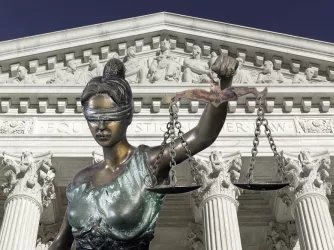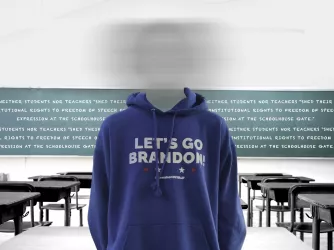Table of Contents
Editorial Warns of Brandeis’s Waning Reputation Over Speech Controversies
Yesterday's issue of Brandeis University's Justice student newspaper features a hard-hitting editorial that once again takes Brandeis Provost Marty Krauss to task for her handling of the case of professor Donald Hindley, who had a monitor placed in his classes by Krauss after he explained and critiqued the use of the term "wetback" in class.
The editorial adds to the avalanche of bad press, both internal and external, about Brandeis's handling of the case. It would be simple enough to do justice in the case by reversing the flawed finding that Hindley had somehow engaged in harassment or discrimination during his class, but the Brandeis administration has stubbornly refused to do so.
Some choice quotations from the editorial:
The CFRR [the Brandeis faculty's Committee on Faculty Rights and Responsibilities] has asserted on several occasions that Ms. Krauss was responsible for serious violations of faculty rights during this process. While the faculty handbook requires the provost to inform the Faculty Senate of possible terminations and states that the CFRR hears faculty appeals of penalties imposed by the administration, Ms. Krauss threatened Mr. Hindley with termination last October without consulting the Senate and denied the CFRR's authority in the appeals process....
But the greater consequences of the Hindley ordeal are for free speech at Brandeis. If the administration does not respect the voice of the faculty, it can't be counted on to defend students' rights to free speech. The administration has violated free speech in the past, such as when it removed a student's exhibit of drawings by Palestinian children from the library in 2006, and seems as willing as ever to censor free speech again.
Indeed, for actions like these, Brandeis has joined Johns Hopkins, Tufts, and Valdosta State University on our "Red Alert" list, which is reserved for the worst, most unrepentant violators of the principles of free expression among U.S. colleges and universities.
The editorial concludes:
The University is developing a dangerously poor reputation on upholding faculty speech and faculty rights in general... No solution to this problem can be taken seriously until the Provost reaffirms the CFRR's authority. The future of free speech on this campus is at stake.
Thanks to the Justice for continuing to address the speech and due process failures in Professor Hindley's case.
Recent Articles
FIRE’s award-winning Newsdesk covers the free speech news you need to stay informed.

Supreme Court must halt unprecedented TikTok ban to allow review, FIRE argues in new brief to high court

Australia blocks social media for teens while UK mulls blasphemy ban

Media on the run: A sign of things to come in Trump times? — First Amendment News 451
